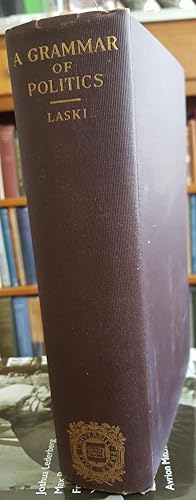LASKI, HAROLD J OSEPH 1893 1950 (1 resultados)
Tipo de artículo
- Todo tipo de artículos
- Libros (1)
- Revistas y publicaciones
- Cómics
- Partituras
- Arte, grabados y pósters
- Fotografías
- Mapas
-
Manuscritos y
coleccionismo de papel
Condición
- Todo
- Nuevos
- Antiguos o usados
Encuadernación
- Todo
- Tapa dura
- Tapa blanda
Más atributos
- Primera edición
- Firmado
- Sobrecubierta
- Con imágenes del vendedor
- Sin impresión bajo demanda
Ubicación del vendedor
Valoración de los vendedores
-
A Grammar of Politics.
Publicado por London: George Allen & Unwin, 1925., 1932
Librería: Ted Kottler, Bookseller, Redondo Beach, CA, Estados Unidos de America
Libro Original o primera edición
Hardcover. Condición: Very Good. No Jacket. 1st Edition. First Edition. 672 pp. Original cloth. Very Good+, without dust jacket. 'A Grammar of Politics, the last of his major early scholarly books, made clearer Laski's growing ambivalence in regard to a libertarian philosophy. The state remained the enemy, but now he was becoming more concerned with the problem of achieving and enforcing equality. Sovereignty was limited, and men must be true to the 'realisation of what is best in themselves.' Yet rights too were limited and included duties that were not independent of society. 'We have them because we are members of the State.' Because the state was, however, only a means and not itself an end, one's duty was 'to the ideal the actual State must seek to serve.' While the state 'should always be called into account when it invades rights,' Laski recognized that in the complex modern world 'State invasions of private liberty may be more subtle.' There must accordingly be a free press, greater access to formal education, and economic liberty in the sense of security and opportunity. Though equality did not 'mean identity of treatment,' it did entail 'first of all the absence of special privilege.' Laski concluded that the modern citizen was being driven to look at the nation-state in new ways even though he optimistically predicted that state sovereignty was in the process of disappearing in international affairs. This concern over foreign policy, as well as his developing Marxist interpretation of history, increasingly dominated the new introductory chapters with which he prefaced subsequent editions of the Grammar of Politics' (Arthur A. Ekirch, Jr., 'Harold J. Laski: The Liberal Manqué or Lost Libertarian?', Journal of Libertarian Studies, Vol. IV, No. 2, Spring 1980.


